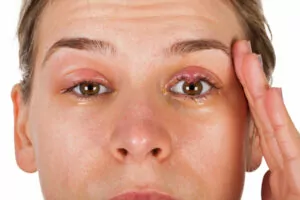
Conjunctivitis is caused by an inflammation of the conjunctiva (the mucous membrane underneath the eyelid) which can be caused by bacteria, viruses or allergies. You may have heard of this being called ‘pink eye’, owing to the not so appealing redness that it can cause around the eye. Conjunctivitis, or pink eye is very prevalent, being the cause for 1% of all visits to GP surgeries in the UK. Despite this, it usually clears up without the need for medical intervention. There are natural remedies for Conjunctivitis as it can be managed with easy and effective treatments from the comfort of your own home.
Understanding Conjunctivitis
Conjunctivitis is most commonly caused by bacteria, viruses or allergies. Foreign objects in the eye, contact lenses, fungi or parasites can also be culprits for it however. Viral conjunctivitis is the most common type of conjunctivitis. It is highly contagious, and can be passed by contact from hands which have been contaminated by the virus. One study found that 46% of infected people had positive cultures grown from swabs of their hands. So, if you were looking for a reminder to wash your hands often, this is it! Conjunctivitis can also be spread through coughing and sneezing, which spread of droplets from the respiratory tract. Even more reason to keep your mitts clean after coughing or sneezing.
Bacterial conjunctivitis can be spread, similarly, through direct contact between one person and another, or through coughing and sneezing. It can also be spread from contaminated objects, through sexual encounters, or from mother to baby.
Another type of conjunctivitis, allergic conjunctivitis, can arise as a result of the body’s reaction to allergens, such as pollen, dust mites, pet hair, molds, or contact lenses. This is more common in those who suffer from conditions such as hay fever, asthma (which is treated by inhalers), and eczema.
Conjunctivitis can spread in a range of different ways and is highly contagious. Keep reading to find out some natural remedies for conjunctivitis.
What are the Symptoms?
If you are suffering from conjunctivitis, you may find symptoms such as:
· Redness
· Discomfort which may be described as grittiness, burning, or the presence of a foreign body
· Watering and discharge which may cause temporary blurred vision. This discharge may make it difficult to open your eyes in the morning.
· Itchiness
If you’re suffering with these symptoms, recovering from conjunctivitis is possible and can be aided with the use of some remedies you can find in your own home.
Natural Remedies for Conjunctivitis
Recovering from conjunctivitis usually happens on its own in 1-2 weeks. If you wish to relieve your symptoms in the meantime, however, here are some natural remedies for conjunctivitis you can try:
· Warm compresses – Use a clean, warm, damp cloth to help loosen the crust that may have formed around your eye.
· Saline solution – These can be purchased over the counter at your pharmacy, or made by yourself by boiling some water and adding one teaspoon of salt. Once this has been dissolved, and the water has cooled, you can use it to help flush out the bacteria or virus that is causing your infection.
· Cucumber slices – Cucumber slices have been found to have benefits when applied to the eyes, such as cooling and hydration, as well as an anti-inflammatory effect. This may help alleviate swelling and discomfort. · Tea bags – Tea bags have anti-inflammatory and anti-viral properties, and have anecdotally been suggested to improve the symptoms of conjunctivitis. You can do this by placing the teabag into hot water as normal, squeezing out the excess, and when it has cooled down applying it to the eye as either a warm or a cool compress.
Hygiene Practices to Manage Conjunctivitis
There are some ways that you can protect yourself from the spread of conjunctivitis. Some other natural remedies for conjunctivitis that you should follow daily are:
· Practice regular hand-washing with warm soapy water – This is one of the most effective ways of stopping infections from spreading from person to person. Are you washing your hands properly? A guide to proper hand washing can be found here. · Use an antibacterial hand gel, such as this one between hand washes, such as when you get on and off public transport, to help kill bacteria before it gets the chance to thrive.
· Wash your towels, pillow cases and wash clothes regularly, and do not share these with others who may have the condition – You may share a space with someone who is recovering from conjunctivitis, it is important not to share items with them which may spread the bacteria or virus to yourself.
· Avoid touching your eyes with your hands – This can pass the infection to your eyes.
Pharmacy Treatments for Conjunctivitis
There are treatments that you can get from your high street pharmacy or online pharmacy. A pharmacist will most likely prescribe you eye drops that help reduce the symptoms of itchy and irritable eyes. Sodium Cromoglicate can be ordered online through e-Surgery and will be delivered directly to your door.

When to seek medical attention
If you have conjunctivitis, it can be helped with the use of home remedies, however it is important to seek medical attention in cases where:
· It has not cleared itself within two weeks
· You wear contact lenses
· A baby has it who is less than 2 years old
· There is pain
· You have sensitivity to light (photophobia)
· You have blurred vision that does not resolve when discharge is wiped
· You have a weakened immune system
Conjunctivitis can be caused by a range of aggressors such as viruses, bacteria or allergens which cause inflammation to the conjunctiva. It can be highly uncomfortable and painful, and is passed through direct contact between individuals, objects or through the air. The contagious nature of it makes recovering from conjunctivitis an important step to stopping the spread to others. It can cause symptoms of redness, itchiness, and pus or water.
These usually resolve on their own, however can be aided by home remedies such as warm compresses, saline solution, cucumber or teabags. Whilst these can provide some relief, it is important to seek medical advice from your pharmacist or GP, when necessary, to avoid further complications arising. You can also use e-Surgery’s ‘Ask a Pharmacist’ section for a free consultation with a healthcare professional who can offer you advice.







